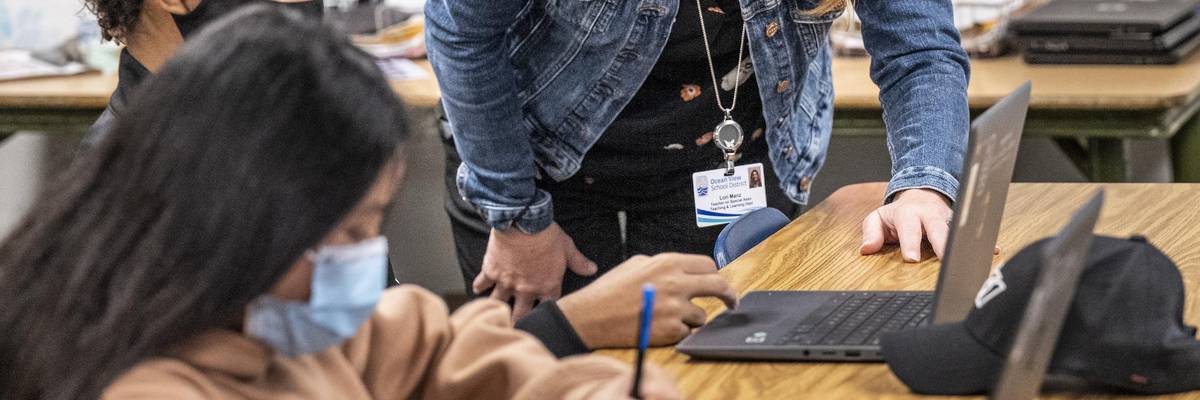

SUBSCRIBE TO OUR FREE NEWSLETTER
Daily news & progressive opinion—funded by the people, not the corporations—delivered straight to your inbox.
5
#000000
#FFFFFF
To donate by check, phone, or other method, see our More Ways to Give page.


Daily news & progressive opinion—funded by the people, not the corporations—delivered straight to your inbox.

Lori Manz, who is normally a curriculum specialist in the Teaching and Learning Department at the Ocean View School District, substitute teaches in a 7th grade math class at Vista View Middle School in Huntington Beach, Calif. on Thursday, January 20, 2022. Manz spent much of her 26 years in education as a teacher has been back in the classroom since school resumed from winter break. Many schools are doing what they can to fill staff absences during the omicron-driven surge of the coronavirus pandemic. (Photo: Paul Bersebach/MediaNews Group/Orange County Register via Getty Images)
New polling out Tuesday reveals pervasive burnout among the nation's educators as pandemic-related staffing shortages and other difficulties drive a potential exodus from the teaching profession.
Released by the National Education Association, the nation's largest union of any profession, the member survey shows, according to NEA president Becky Pringle, that "after persevering through the hardest school years in memory, America's educators are exhausted and increasingly burned out."
While staffing shortages at the nation's schools existed pre-pandemic, Pringle said the current situation represents "an unprecedented staffing crisis across every job category" that hurts both education professionals and students alike.
Nearly three-quarters of respondents, for example, said that they've had to fill in for colleagues or take on additional duties. Schools being short-staffed also means students who need one-on-one instruction aren't getting that need met.
The survey was conducted January 14-24 by GBAO Strategies and paints a clear picture of educators who are absolutely fried.
According to an NEA statement, 90% of members said feeling burned out is a serious problem, and 67% said it was a very serious problem. Ninety-six percent of respondents support boosting educator salaries to help address the problem.
Covid-related stress is widespread, as 91% report it being a serious problem for educators.
That stress is prompting many to at least start thinking about packing their bags.
The survey found that 55% of members plan to leave the field sooner than planned because of the pandemic compared to just 37% who felt that way in August.
In terms of creating safer environments amid the airborne virus, 95% of members say they back improved ventilation in schools though just 38% reported witnessing such improvements.
Related Content

And while public health experts stress the need for continued mask-wearing, over a third of NEA members say mask and mitigation policies have actually been loosened since the start of the school year.
Pringle didn't mince words in describing the situation.
"This is a five-alarm crisis," she said. "We are facing an exodus as more than half of our nation's teachers and other school staff are now indicating they will be leaving education sooner than planned. If we're serious about getting every child the support they need to thrive, our elected leaders across the nation need to address this crisis now."
Beyond getting "our collective respect," she said that properly responding to the crisis entails "paying educators like the professionals they are, ensuring that their students can get the mental health support they need, protecting them from Covid, and addressing the staff shortages so our educators can do what they do best--helping every student thrive."
Dear Common Dreams reader, The U.S. is on a fast track to authoritarianism like nothing I've ever seen. Meanwhile, corporate news outlets are utterly capitulating to Trump, twisting their coverage to avoid drawing his ire while lining up to stuff cash in his pockets. That's why I believe that Common Dreams is doing the best and most consequential reporting that we've ever done. Our small but mighty team is a progressive reporting powerhouse, covering the news every day that the corporate media never will. Our mission has always been simple: To inform. To inspire. And to ignite change for the common good. Now here's the key piece that I want all our readers to understand: None of this would be possible without your financial support. That's not just some fundraising cliche. It's the absolute and literal truth. We don't accept corporate advertising and never will. We don't have a paywall because we don't think people should be blocked from critical news based on their ability to pay. Everything we do is funded by the donations of readers like you. Will you donate now to help power the nonprofit, independent reporting of Common Dreams? Thank you for being a vital member of our community. Together, we can keep independent journalism alive when it’s needed most. - Craig Brown, Co-founder |
New polling out Tuesday reveals pervasive burnout among the nation's educators as pandemic-related staffing shortages and other difficulties drive a potential exodus from the teaching profession.
Released by the National Education Association, the nation's largest union of any profession, the member survey shows, according to NEA president Becky Pringle, that "after persevering through the hardest school years in memory, America's educators are exhausted and increasingly burned out."
While staffing shortages at the nation's schools existed pre-pandemic, Pringle said the current situation represents "an unprecedented staffing crisis across every job category" that hurts both education professionals and students alike.
Nearly three-quarters of respondents, for example, said that they've had to fill in for colleagues or take on additional duties. Schools being short-staffed also means students who need one-on-one instruction aren't getting that need met.
The survey was conducted January 14-24 by GBAO Strategies and paints a clear picture of educators who are absolutely fried.
According to an NEA statement, 90% of members said feeling burned out is a serious problem, and 67% said it was a very serious problem. Ninety-six percent of respondents support boosting educator salaries to help address the problem.
Covid-related stress is widespread, as 91% report it being a serious problem for educators.
That stress is prompting many to at least start thinking about packing their bags.
The survey found that 55% of members plan to leave the field sooner than planned because of the pandemic compared to just 37% who felt that way in August.
In terms of creating safer environments amid the airborne virus, 95% of members say they back improved ventilation in schools though just 38% reported witnessing such improvements.
Related Content

And while public health experts stress the need for continued mask-wearing, over a third of NEA members say mask and mitigation policies have actually been loosened since the start of the school year.
Pringle didn't mince words in describing the situation.
"This is a five-alarm crisis," she said. "We are facing an exodus as more than half of our nation's teachers and other school staff are now indicating they will be leaving education sooner than planned. If we're serious about getting every child the support they need to thrive, our elected leaders across the nation need to address this crisis now."
Beyond getting "our collective respect," she said that properly responding to the crisis entails "paying educators like the professionals they are, ensuring that their students can get the mental health support they need, protecting them from Covid, and addressing the staff shortages so our educators can do what they do best--helping every student thrive."
New polling out Tuesday reveals pervasive burnout among the nation's educators as pandemic-related staffing shortages and other difficulties drive a potential exodus from the teaching profession.
Released by the National Education Association, the nation's largest union of any profession, the member survey shows, according to NEA president Becky Pringle, that "after persevering through the hardest school years in memory, America's educators are exhausted and increasingly burned out."
While staffing shortages at the nation's schools existed pre-pandemic, Pringle said the current situation represents "an unprecedented staffing crisis across every job category" that hurts both education professionals and students alike.
Nearly three-quarters of respondents, for example, said that they've had to fill in for colleagues or take on additional duties. Schools being short-staffed also means students who need one-on-one instruction aren't getting that need met.
The survey was conducted January 14-24 by GBAO Strategies and paints a clear picture of educators who are absolutely fried.
According to an NEA statement, 90% of members said feeling burned out is a serious problem, and 67% said it was a very serious problem. Ninety-six percent of respondents support boosting educator salaries to help address the problem.
Covid-related stress is widespread, as 91% report it being a serious problem for educators.
That stress is prompting many to at least start thinking about packing their bags.
The survey found that 55% of members plan to leave the field sooner than planned because of the pandemic compared to just 37% who felt that way in August.
In terms of creating safer environments amid the airborne virus, 95% of members say they back improved ventilation in schools though just 38% reported witnessing such improvements.
Related Content

And while public health experts stress the need for continued mask-wearing, over a third of NEA members say mask and mitigation policies have actually been loosened since the start of the school year.
Pringle didn't mince words in describing the situation.
"This is a five-alarm crisis," she said. "We are facing an exodus as more than half of our nation's teachers and other school staff are now indicating they will be leaving education sooner than planned. If we're serious about getting every child the support they need to thrive, our elected leaders across the nation need to address this crisis now."
Beyond getting "our collective respect," she said that properly responding to the crisis entails "paying educators like the professionals they are, ensuring that their students can get the mental health support they need, protecting them from Covid, and addressing the staff shortages so our educators can do what they do best--helping every student thrive."